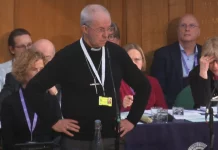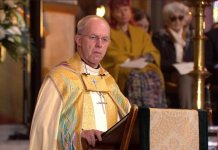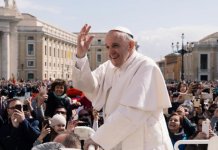When one of my previous bosses, a university vice-chancellor, wanted to show his contempt for a problem, he would dismiss it as a “theological” issue. I always thought this showed a lack of a grasp of both history as well as theology, but then he was an economist. Coronations usually throw up political problems. This one is producing theological ones, and it is creating waves.
The publication of the liturgy for the impending coronation of King Charles III has been delayed. It is being suggested by those in the know that this is because the King has taken one theological view of the purpose of a coronation while other people, as yet unnamed, a different view.
“Ask in my name,” promised Jesus “and you will receive.” And so we do. All Christian prayer is made as an act of trust that Jesus was who He claimed to be, always implicitly, often explicitly: “we ask this in the name of Jesus Christ our Lord”.
At the heart of this is the question of what happens if you offer a prayer in a Christian Church, abbey, or chapel dedicated to Jesus, at a service invoking the presence of Jesus, but you do it “in the name of” Shiva, Mohammed, Buddha or even perhaps Gaia? Two obvious questions present themselves: does this honour Jesus? Is it consistent with the values and intentions of the occasion?
Lord Harries, the retired bishop of Oxford, made waves in 2014 when he publicly urged that the Koran should be read at the next coronation, in order to make Muslims feel they were included. This caused waves at the time, and it was pointed out that it would be difficult to know quite where to stop.
Why only the Muslims? One could hardly exclude the Bhagavad Gita and overlook Hindus, or the Sikh’s Guru Granth Sahib. And what should be read to represent the dramatic rise of the New Atheists led by Dawkins and Fry? Perhaps a few choice ironic phrases from “The Hitchhiker’s Guide to the Galaxy” in memory of the wonderful Douglas Adams who did so much to put religion in its place? For Charles will be reigning as King in these islands for all faiths, and indeed for none.
For a while I spent time in similar circles to Lord Harries. I was one of the advisors to Sir Sigmund Sternberg’s illustrious “Three Faiths Forum”, and part of a discreet group of Anglican theologians who would be found at interfaith gatherings with benign Islamic scholars, exploring the concept of the cousinhood of Abrahamic faiths. King Charles’ own outlook shares the presuppositions of this culture.
And it is at presuppositions that we ought to start if we are going to understand the clash of culture and ideology which lies behind the delayed coronation liturgy. Mine changed. King Charles’s have not.
King Charles was profoundly influenced as a young man by a writer and adventurer called Laurens Van der Post. Van der Post was a devotee of Karl Gustav Jung. Jung was a psychiatrist and therapist who bucked his own culture (dominated by his one-time mentor Sigmund Freud), by understanding that religion and religious instinct was a powerful tool for providing an overarching structure of meaning uniting the conscious and unconscious. When Jung talked about “god”, he meant not the God of Abraham, Isaac and Jacob, but the human psyche. For Jung, all (healthy) religion, was not only useful but vital to the human task of individuation, or self-realisation.
And this is where the fault line lies.
Behind the multi-purpose and unhelpfully ambiguous word ‘god’ what is meant? Who or what is bowed down to? Is god a function of our flourishing, or is our existence, now and beyond time and space, dependent on how we relate to God? Is the most fundamental question anthropology or theology?
In the world-view of Charles III (and Jung) it’s anthropology.
The distinctions between the religions are of much less significance than the usefulness or authenticity of religions (and/or spirituality) for the human quest for self-understanding.
If you add to this the political priority of using the monarchy to unite a multi-cultural, diverse nation in which “inclusion” (in the woke definition) is both a glue, and a goal, then achieving the symbolic participation of different religious voices in a public ritual like the coronation is a highly desirable goal. It may also perhaps be, certainly symbolically, and as a declaration of ideological conviction, and even politically, the desirable goal. It acts as a leverage of cohesion and support.
But, what if the prime question if in fact theological? The essential natures of Christianity, the Church and the coronation are founded on a different philosophical presupposition. What if this is a veiled or proxy conflict between Jung (King Charles) and Jesus (the Church and coronation)? Between anthropology and theology?
The challenge facing many Christians in a multi-cultural, multi-value zeitgeist is that while believing in God may or not be a challenge, believing in Jesus certainly is. G(g)od in his pluriformity of meaning can unite. But Jesus divides on account of his outrageous (to some) claim that He is the way, the truth and the life, and no one comes to the father except by him (John 14.6).
This is what is known as the scandal of particularity. It is embedded at the heart of Christian (and Jewish) revelation. It is so profoundly counter-cultural, that for many people, repetitively brainwashed by relativism and universalism, it is not only unacceptable, but also deeply offensive.
However, an understanding of its claims is essential to grasping the cultural stress the Church lives with and contributes to.
However problematic it may be to our indoctrinated world-view, most of us in practice adopt this scandal of particularity in the way we live and love.
We love some individuals uniquely and exclusively; our spouses and children, for example. This principle of concrete-to-universal knowing and loving is well expressed by John Duns Scotus. He reminds us that God only created particulars and individuals, a quality he named “thisness” (haecceity). Thisness also grounds the principle of incarnation in the concrete and the specific. You can’t really love universals. It’s hard to love concepts, forces or ideas, though we often pretend to for the sake of appearing virtuous. (Ideology may just be the ego wrapping itself around such abstractions.)
But it was C.S Lewis whose clarity of thought made most sense of this angle of approach. Acknowledging that in the Christian narrative God’s peculiar way of choosing particular people for his purposes is an offence to our modern sensibilities, he wrote:
“To be quite frank, we do not at all like the idea of a ‘chosen people’. Democrats by birth and education, we should prefer to think that all nations and individuals start level in the search for God, or even that all religions are equally true. It must be admitted at once that Christianity makes no concessions to this point of view. It does not tell of a human search for God at all, but of something done by God for, to, and about Man. And the way in which it is done is selective, undemocratic, to the highest degree. After the knowledge of God had been universally lost or obscured, one man from the whole earth (Abraham) is picked out. He is separated (miserably enough, we may suppose) from his natural surroundings, sent into a strange country, and made the ancestor of a nation who are to carry the knowledge of the true God. Within this nation there is further selection: some die in the desert, some remain behind in Babylon. There is further selection still. The process grows narrower and narrower, sharpens at last into one small bright point like the head of a spear. It is a Jewish girl at her prayers. All humanity (so far as concerns its redemption) has narrowed to that.” (Miracles, Chapter 14)
The reason that Jesus is the only way to the Father, is that it was only in Jesus that that the Godhead entered creation in order to square the impossible circle of free will holiness, justice, forgiveness and love.
To the surprise of many, the English (now British) concept of both Kingship and coronation grows organically out of this ideology of particularly.
The ritual of anointing, central to the heart of the coronation ritual, finds its origins in the prophet Samuel anointing the shepherd boy David as King of Israel. This anointing expresses an exclusive mutual covenant of purpose between God and his anointed. This purpose will flow like a river cascading from a spring towards the estuary of the incarnation in which God will expand his invitation to the rest of His creation, from the estuary to the wide sea; but always embedded and personified in the particular, as a way of reaching out to the universal. Particularity precedes the universal.
The conflict between Charles and the Church is because Charles’ values and philosophy, defending all the faiths, whilst reflecting the culture of the age, not only reverses this relation of the particular to the universal, but wipes out the claims of the unique particulars of Jesus; a way, not the way.
Does this matter to the coronation?
The monarchy as a concept is not just a matter of power. For that we could go to Nietzsche. Nor is it a matter of social and political self-actualisation. For that we can go to Jung and the therapists. All its ritual flows from the experience of God breaking into history in a unique and very particular way that found its ultimate expression in Jesus the logos on the cross. A sacrifice of love drawing each of us into the intimacy of forgiveness.
Muslims reject this. It is a profound offence to the unknowability and inaccessibility of God, whose primary demand is not the adoration of the forgiven, but submission of the recalcitrant. In fact all other religions reject Jesus in the terms that He presents Himself.
The anointing of the monarch borrows from the anointing of the episcopate and priesthood. In the office of the monarch, power and service, state and God, authority and accountability coinhere. It is not essentially an exercise in the development of the theory of constitutional monarchy; it is the slow and steady adaption of a vision of the relationship between God and humanity set in the organic expression of a Christian state.
Multi-cultural and inter-religious relativism is an offence to and a repudiation of the unique claims of Jesus embodied in the Abbey in which the coronation takes place.
The office of King is not a delegation of symbolic authority from the demos in pursuit of personal or political development. It is the inheritance of an office which reflects the pursuit of a particular balance between heaven and earth, Christ and his Church, power and protection, authority and service. These virtuous paradoxes find their roots in the incarnation. Charles cuts off his kingly roots at his peril.










